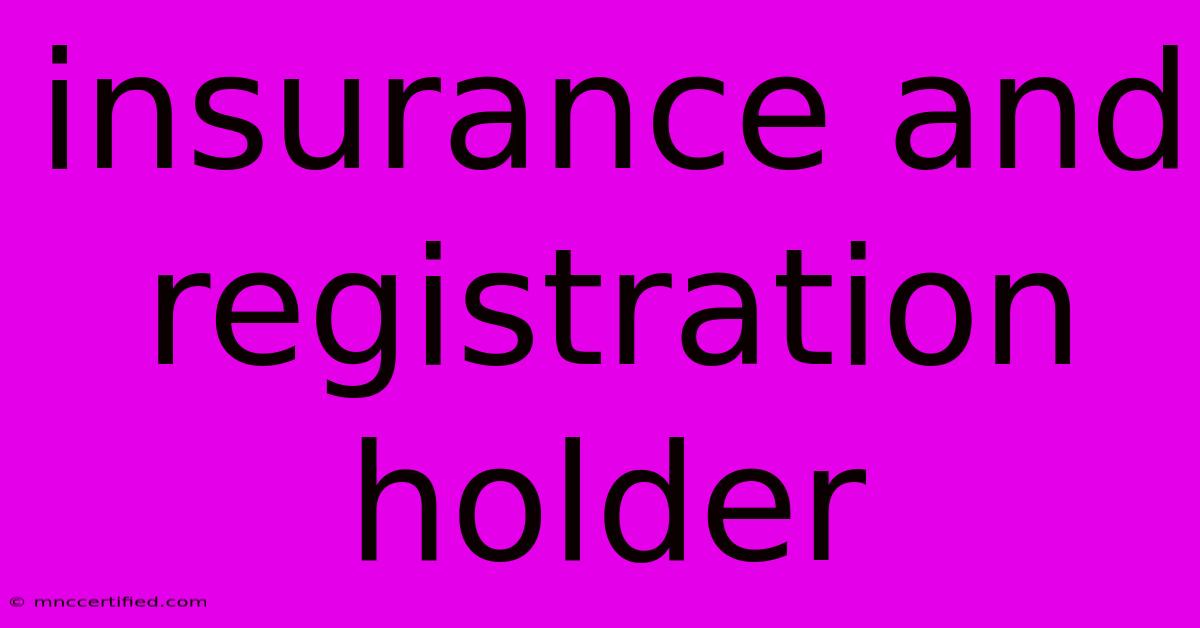Insurance And Registration Holder

Table of Contents
Insurance and Registration Holder: Understanding the Crucial Connection
Owning a vehicle comes with responsibilities, and two of the most critical are securing proper insurance and ensuring the registration is correctly held. Understanding the relationship between the insurance holder and the registration holder is vital to avoiding legal trouble and financial burdens. This article delves into the intricacies of this connection, addressing common questions and clarifying potential misconceptions.
Who is the Registration Holder?
The registration holder is the legal owner of the vehicle, as indicated on the vehicle's registration certificate. This individual is responsible for ensuring the vehicle is legally operated and maintained, including adhering to all relevant regulations. They are the person who receives notices and correspondence concerning the vehicle from the Department of Motor Vehicles (DMV) or equivalent registering authority. Importantly, the registration holder is not always the same person as the primary driver or even the insurance policyholder.
Consequences of Incorrect Registration
Incorrect registration can lead to significant consequences, including:
- Fines and Penalties: Failure to register a vehicle or maintain accurate registration information can result in hefty fines.
- Vehicle Impoundment: In some cases, unregistered vehicles can be impounded by law enforcement.
- Legal Issues: Driving an unregistered vehicle can result in legal charges and court appearances.
- Insurance Issues: Lack of proper registration may invalidate your insurance policy, leaving you financially vulnerable in case of an accident.
Who is the Insurance Holder?
The insurance holder is the individual or entity named on the insurance policy. They are the ones who pay the premiums and are responsible for fulfilling the terms and conditions of the insurance agreement. While the insurance holder often owns the vehicle, this is not always the case. For instance, a parent might hold the insurance for a vehicle owned and driven by their child. Similarly, a leasing company might be the insurance holder for a vehicle leased to an individual.
Types of Insurance Coverage
Understanding the different types of insurance coverage is crucial. Common types include:
- Liability Insurance: This covers damages or injuries you cause to others. It's typically legally required.
- Collision Insurance: This covers damage to your vehicle in an accident, regardless of fault.
- Comprehensive Insurance: This covers damage to your vehicle from non-accident events like theft or vandalism.
The Connection Between the Insurance Holder and Registration Holder
The ideal scenario is when the registration holder and the insurance holder are the same person. This simplifies matters considerably and reduces the potential for confusion and legal complications. However, it’s important to understand that they can be different individuals. In such cases, clear communication and documentation are crucial. The insurance policy should clearly indicate who is insured, and the registration should accurately reflect the vehicle's ownership.
Potential Complications When They Differ
When the registration holder and insurance holder are different, issues can arise, particularly in the event of an accident. Claims processing can become more complex, and determining liability might require additional documentation. It’s essential to ensure the insurance policy covers all potential drivers and that the registration accurately reflects the current ownership.
Best Practices for Avoiding Issues
To avoid complications, consider these best practices:
- Maintain Accurate Registration: Ensure your vehicle registration is up-to-date and reflects the current owner.
- Proper Insurance Coverage: Secure comprehensive insurance coverage appropriate to your needs and driving habits. Always inform your insurer of any changes in ownership or primary drivers.
- Clear Communication: If the registration and insurance holders are different, maintain open communication and ensure both parties understand their respective responsibilities.
- Documentation: Keep copies of your registration certificate and insurance policy readily available.
By understanding the relationship between the insurance holder and the registration holder, and by following best practices, you can ensure smooth sailing and avoid potential legal and financial pitfalls associated with vehicle ownership. Remember, proactive management of your vehicle's registration and insurance is crucial for responsible vehicle ownership.

Thank you for visiting our website wich cover about Insurance And Registration Holder. We hope the information provided has been useful to you. Feel free to contact us if you have any questions or need further assistance. See you next time and dont miss to bookmark.
Featured Posts
-
Insurance Verifier Job Description
Nov 23, 2024
-
Peter Kay Fans Rejoice Iom Added
Nov 23, 2024
-
Wicked Musical A Bewitching Tale
Nov 23, 2024
-
Ethereum Erc20 Contract Address
Nov 23, 2024
-
Casey Concedes Pennsylvania Senate Race
Nov 23, 2024